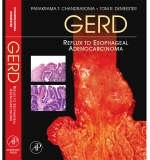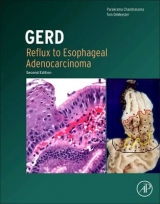
GERD
Elsevier Science Publishing Co Inc (Verlag)
978-0-12-369416-4 (ISBN)
- Titel erscheint in neuer Auflage
- Artikel merken
Gastroesophageal Reflux Disease (GERD) is one of the most common maladies of mankind. Approximately 40% of the adult population of the USA suffers from significant heartburn and the numerous antacids advertised incessantly on national television represents a $8 billion per year drug market. The ability to control acid secretion with the increasingly effective acid-suppressive agents such as the H2 blockers (pepcid, zantac) and proton pump inhibitors (nexium, prevacid) has given physicians an excellent method of treating the symptoms of acid reflux.
Unfortunately, this has not eradicated reflux disease. It has just changed its nature. While heartburn, ulceration and strictures have become rare, reflux-induced adenocarcinoma of the esophagus is becoming increasingly common. Adenocarcinoma of the esophagus and gastric cardia is now the most rapidly increasing cancer type in the Western world.
The increasing incidence of esophageal adenocarcinoma has created an enormous interest and stimulus for research in this area. GERD brings together a vast amount of disparate literature and presents the entire pathogenesis of reflux disease in one place. In addition to providing a new concept of how gastroesophageal reflux causes cellular changes in the esophagus, GERD also offers a complete solution to a problem that has confused physicians for over a century. Both clinical and pathological information about reflux disease and its treatment are presented. GERD is meant to be used as a comprehensive reference for gastroenterologists, esophageal surgeons, and pathologists alike.
Dr. Parakrama Chandrasoma was born in Sri Lanka and received his medical education and initial pathology training in the Medical School of the University of Sri Lanka. He has postgraduate degrees in internal medicine, including the M.D. (Sri Lanka) and Membership of the Royal College of Physicians (UK). He immigrated to the United States in 1978. Upon completing his pathology residency, he assumed duties as Chief of Surgical Pathology at the Los Angeles County + University of Southern California Medical Center He has held this position since. After an initial interest in neuropathology, Dr. Chandrasoma joined Dr. Tom DeMeester’s Foregut Surgery team as pathologist in 1991. This led to a productive study of gastroesophageal reflux disease spanning 16 years and resulting in the development of numerous original concepts relating to the pathogenesis of gastroesophageal reflux disease. Dr. Chandrasoma has written over 140 peer reviewed papers and 6 previous pathology textbooks, including a general text on Gastrointestinal Pathology and a text on Gastroesophageal Reflux Disease, and is a Professor of Pathology at the Keck School of Medicine at the University of Southern California. He is married with three children and lives in Pasadena, California. Professor of Clinical Surgery and Chair of the Department of Surgery, Keck School of Medicine, University of Southern California, Los Angeles, CA, USA.
Chapter 1: Overview of Gastroesophageal Reflux Disease
Chapter 2: The Past, Present, and Future of Columnar-Lined (Barrett) Esophagus
Chapter 3: Fetal Development of the Esophagus and Stomach
Chapter 4: Normal Anatomy; Present Definition of the Gastroesophageal Junction
Chapter 5: Histologic Definitions and Diagnosis of Epithelial Types
Chapter 6: Cardiac Mucosa
Chapter 7: New Histologic Definitions of Esophagus, Stomach, and Gastroesophageal Junction
Chapter 8: Pathology of Reflux Disease at a Cellular Level: Part 1—Damage to Squamous Epithelium and Transformation into Cardiac Mucosa
Chapter 9: The Pathology of Reflux Disease at a Cellular Level: Part 2—Evolution of Cardiac Mucosa to Oxyntocardiac Mucosa and Intestinal Metaplasia
Chapter 10: Pathology of Reflux Disease at a Cellular Level: Part 3—Intestinal (Barrett) Metaplasia to Carcinoma
Chapter 11: Pathology of Reflux Disease at an Anatomic Level
Chapter 12: Reflux Disease Limited to the Dilated End-Stage Esophagus: The Pathologic Basis of NERD
Chapter 13: Definition of Gastroesophageal Reflux Disease and Barrett Esophagus
Chapter 14: Diagnosis of Gastroesophageal Reflux Disease, Barrett Esophagus, and Dysplasia
Chapter 15: Research Strategies for Preventing Reflux-Induced Adenocarcinoma
Chapter 16: Rationale for Treatment of Reflux Disease and Barrett Esophagus
Chapter 17: Treatment Strategies for Preventing Reflux-Induced Adenocarcinoma
Index
| Erscheint lt. Verlag | 19.10.2006 |
|---|---|
| Zusatzinfo | Approx. 350 illustrations; Illustrations |
| Sprache | englisch |
| Maße | 216 x 276 mm |
| Gewicht | 1340 g |
| Themenwelt | Medizinische Fachgebiete ► Innere Medizin ► Gastroenterologie |
| Medizin / Pharmazie ► Medizinische Fachgebiete ► Onkologie | |
| ISBN-10 | 0-12-369416-7 / 0123694167 |
| ISBN-13 | 978-0-12-369416-4 / 9780123694164 |
| Zustand | Neuware |
| Informationen gemäß Produktsicherheitsverordnung (GPSR) | |
| Haben Sie eine Frage zum Produkt? |
aus dem Bereich



